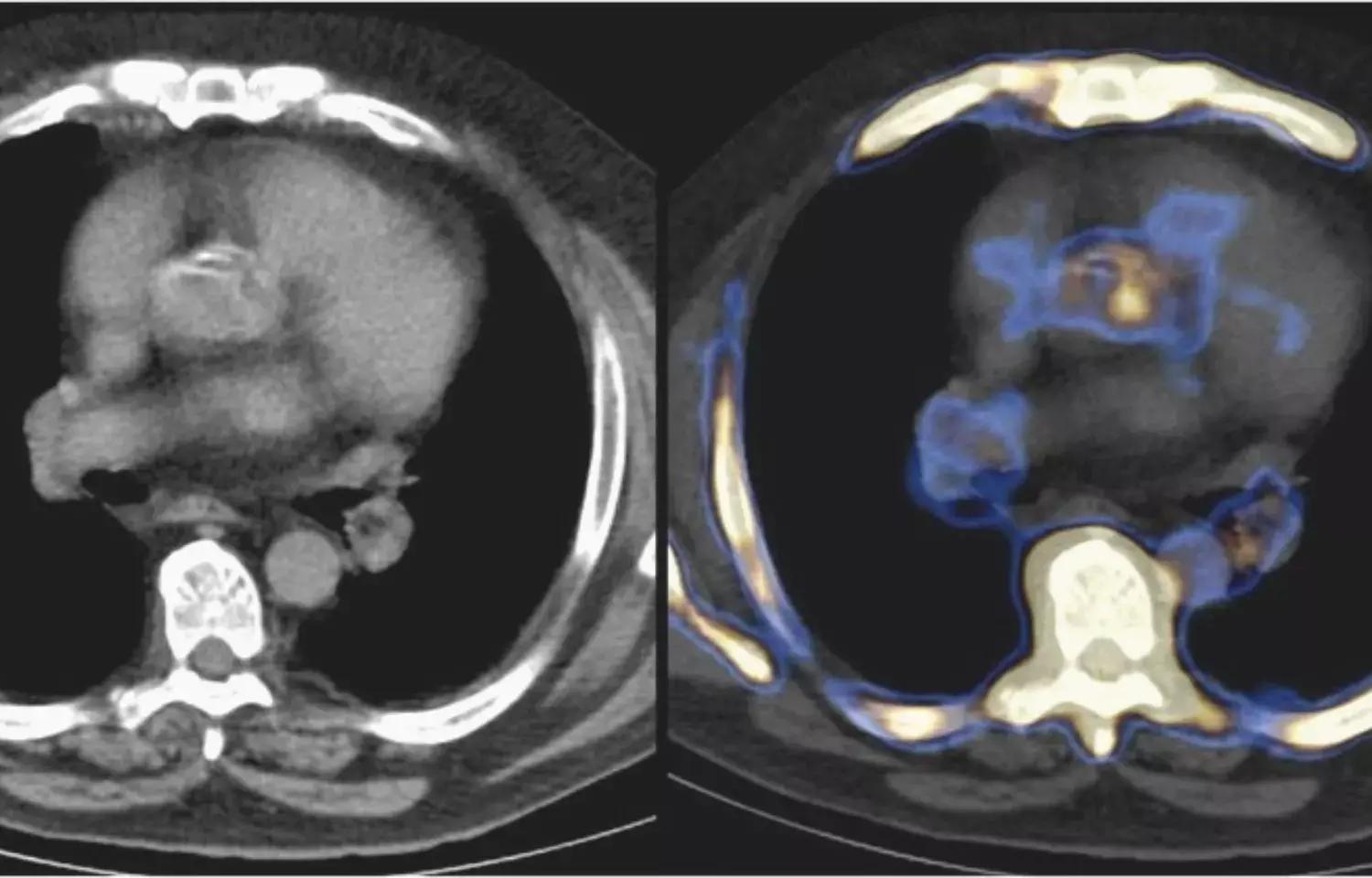Thoracic Aortic 18F-Sodium Fluoride PET Predicts Future Ischemic Stroke In CVD
- byDoctor News Daily Team
- 05 August, 2025
- 0 Comments
- 0 Mins

UK: Thoracic aortic 18F-sodium fluoride activity in patients with established cardiovascular disease (CVD) is associated with the progression of atherosclerosis and future ischemic stroke, states a recent study in the journal JACC: Cardiovascular Imaging.
The study revealed that THE assessment of thoracic 18F-sodium fluoride positron emission tomography (PET) identifies localized areas of atherosclerotic disease activity that are directly associated with disease progression and downstream regional clinical atherothrombotic events.
Aortic atherosclerosis is known to be an important contributor to the risk of ischemic stroke. Identification of patients with high-risk aortic atheroma could boost preventative treatment strategies for future ischemic stroke. Considering this, Alexander J. Fletcher, University of Edinburgh, Edinburgh, United Kingdom, and colleagues aimed to investigate whether thoracic 18F-sodium fluoride positron emission tomography could improve the identification of patients at the highest risk of ischemic stroke in a post hoc observational cohort study.
For this purpose, the researchers quantified thoracic aortic and coronary 18F-sodium fluoride activity in 461 patients with stable cardiovascular disease undergoing PET combined with computed tomography (CT). Change in aortic and coronary CT calcium volume was used to assess the progression of atherosclerosis. The occurrence of ischemic stroke and myocardial infarction determined the clinical outcomes. The prognostic utility of 18F-sodium fluoride activity for predicting stroke was compared to clinical risk scores and CT calcium quantification using survival analysis and multivariable Cox regression.
Based on the study, the researchers found the following:
After 12.7 ± 2.7 months, progression of thoracic aortic calcium volume correlated with baseline thoracic aortic 18F-sodium fluoride activity (n = 140; r = 0.31).
In 461 patients, 23 (5%) patients experienced an ischemic stroke and 32 (7%) a myocardial infarction after 6.1 ± 2.3 years of follow-up.
High thoracic aortic 18F-sodium fluoride activity was strongly associated with ischemic stroke (HR: 10.3), but not myocardial infarction.
High coronary 18F-sodium fluoride activity was associated with myocardial infarction (HR: 4.8) but not ischemic stroke.
In a multivariable Cox regression model including imaging and clinical risk factors, thoracic aortic 18F-sodium fluoride activity was the only variable associated with ischemic stroke (HR: 8.19).
The researchers conclude, "thoracic aortic 18F-sodium fluoride activity is associated with the progression of atherosclerosis and future ischemic stroke in patients with CVD. However, the small number of stroke events means larger, adequately powered cohorts will be needed."
Reference
The study titled, "Thoracic Aortic 18F-Sodium Fluoride Activity and Ischemic Stroke in Patients With Established Cardiovascular Disease," was published in the journal JACC: Cardiovascular Imaging.
DOI: 10.1016/j.jcmg.2021.12.013
KEYWORDS: cardiovascular disease, PET, CT, ischemic stroke, Alexander J Fletcher, 18F-sodium fluoride activity, computed tomography, positron emission tomography, atherosclerotic disease, atherosclerosis
Disclaimer: This website is designed for healthcare professionals and serves solely for informational purposes.
The content provided should not be interpreted as medical advice, diagnosis, treatment recommendations, prescriptions, or endorsements of specific medical practices. It is not a replacement for professional medical consultation or the expertise of a licensed healthcare provider.
Given the ever-evolving nature of medical science, we strive to keep our information accurate and up to date. However, we do not guarantee the completeness or accuracy of the content.
If you come across any inconsistencies, please reach out to us at
admin@doctornewsdaily.com.
We do not support or endorse medical opinions, treatments, or recommendations that contradict the advice of qualified healthcare professionals.
By using this website, you agree to our
Terms of Use,
Privacy Policy, and
Advertisement Policy.
For further details, please review our
Full Disclaimer.
Tags:
Recent News
Merck Keytruda wins European Commission nod for lo...
- 30 October, 2025
UP NEET 2025 round 3 allotment results postponed
- 30 October, 2025
Achin Gupta to succeed Umang Vohra as Cipla MD, GC...
- 30 October, 2025
Mumbai shocker: KEM Hospital doctor stabbed by col...
- 30 October, 2025
Daily Newsletter
Get all the top stories from Blogs to keep track.


0 Comments
Post a comment
No comments yet. Be the first to comment!